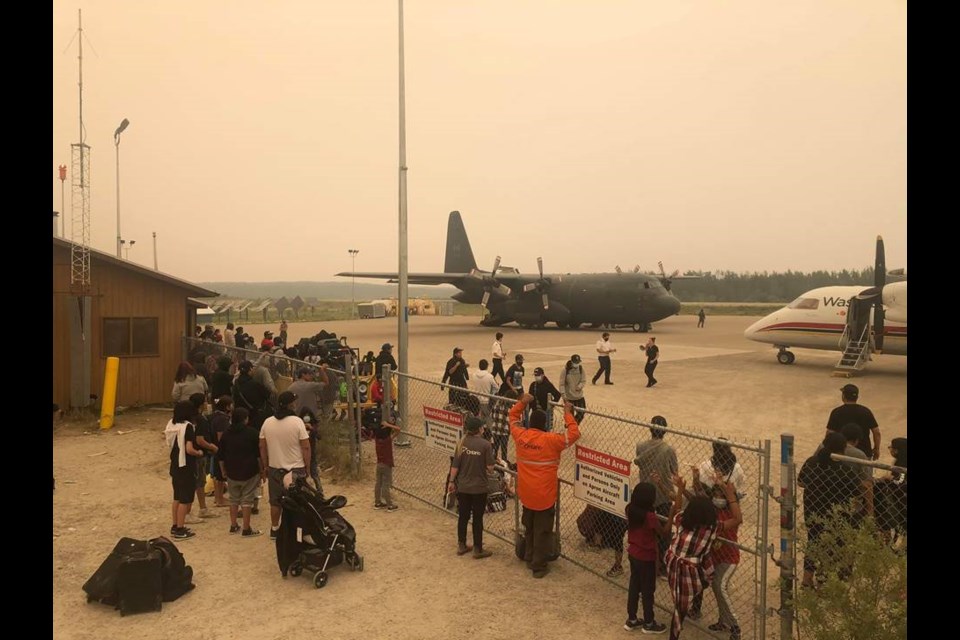THUNDER BAY – Around 400 evacuees are expected to be in Thunder Bay by the end of Monday as forest fires threaten several communities in the Northwest.
That included about 300 members of Poplar Hill First Nation and 101 from Deer Lake First Nation, both located north of Red Lake.
The Municipality of Red Lake itself said in a release Monday there was a “high probability” it would also issue an evacuation order in the coming days, barring a significant improvement in weather and wind conditions.
The community is menaced by two nearby fires, Red Lake 16 and Red Lake 77, which was about 35 kilometres away as of Sunday.
The two fires threatening Poplar Hills and Deer Lake First Nations were both showing extreme fire behaviour on Monday, reported Jonathan Scott, a fire information officer with Ontario’s Ministry of Northern Development, Mines, Natural Resources and Forestry.
The ministry was planning a continuous air attack on the two fires Monday in a bid to limit the spread toward the communities. Options such as setting up sprinklers on structures could be put in place if the fire moves closer, Scott said.
Red Lake 65 was burning at 4,012 hectares about 16 kilometres southwest of Poplar Hill, while Red Lake 51 was burning at 36,235 hectares about 28 kilometres west of Deer Lake.
That caused serious concerns over both smoke and the proximity of the fire to the communities, with residents evacuated by both commercial and military aircraft.
Ron Basaraba, director of sales with Wasaya Airways, said the airline had offered six aircraft Sunday and several on Monday to help evacuate up to 280 members from the two First Nations.
The company also helped evacuate Valard workers from the North Spirit Lake area, he said.
Members of Pikangikum First Nation, about 100 kilometres north of Red Lake, also said they were self-evacuating amid heavy smoke from nearby fires on social media Monday.
Thunder Bay could potentially accommodate roughly 50 more evacuees, said Thunder Bay fire chief Greg Hankkio.
The municipality’s Municipal Emergency Control Group (MECG) met Sunday to discuss the province’s request to serve as host community, advising Ontario it had the capacity for up to 450 evacuees, he said.
“We’ve done this historically – it’s part of being a good neighbour, and we have the ability to help,” he said.
“Really the basis for our decision to land on the numbers we landed on was hotel availability, for one – we’re receiving vulnerable populations, so a hotel setting is really the best way to go. And then it’s just the resources in the municipality… The message we’ve sent to the province at this point is 450 is the maximum right now.”
Factors in determining capacity include the availability of police, fire, EMS, and other community partners like the Red Cross and tribal councils to support evacuees, Hankkio said.
The plan was vetted by medical officer of health Dr. Janet DeMille, and the pandemic hadn’t reduced the city’s capacity to accept evacuees in this case, he said – though it could impact the ability for evacuees to gather at the hotel or go out into the community.
The evacuations come amid a fire season that’s tracking significantly above the 10-year average, according to fire information officer Jonathan Scott.
The Northwest region has seen 576 fires to date this year, compared to the 10-year average to date of 391.
The total hectares burned to date were 181,761 this year, compared to an average of 133,067.
The ministry’s research has shown climate change worsens forest fire conditions, Scott said.
“It’s hard to say if a particular fire is caused by climate change,” he explained. “It’s dependent on weather, but climate change is affecting the length and intensity of fire seasons.”
Most of Northwestern Ontario will experience smoke drift in the coming days from the fires, and from fires in Western Canada, Scott noted.
